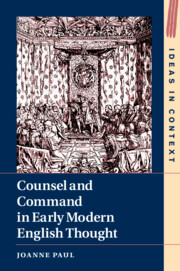Book contents
- Counsel and Command in Early Modern English Thought
- Ideas in Context
- Counsel and Command in Early Modern English Thought
- Copyright page
- Contents
- Acknowledgements
- Introduction
- Part I
- Part II
- Part III
- Chapter 6 Reason of State and the Counsellor
- Chapter 7 Counsel, Command and the Stuarts
- Bibliography
- Index
- Ideas in Context
Chapter 7 - Counsel, Command and the Stuarts
from Part III
Published online by Cambridge University Press: 18 February 2020
- Counsel and Command in Early Modern English Thought
- Ideas in Context
- Counsel and Command in Early Modern English Thought
- Copyright page
- Contents
- Acknowledgements
- Introduction
- Part I
- Part II
- Part III
- Chapter 6 Reason of State and the Counsellor
- Chapter 7 Counsel, Command and the Stuarts
- Bibliography
- Index
- Ideas in Context
Summary
The early Stuarts had a difficult and uncomfortable relationship with counsel. Whereas both James VI/I and Charles I increasingly relied heavily on close favourites to advise them, this mode of counsel was, in a sense, outdated and seen to be suspicious. In response, counsel was increasingly vested in the parliament over and above the Privy Council, encroaching upon kingly authority. If one accepts the Machiavellian/reason of state assumption that all counsellors are self-interested, and that this conflicted with advice-giving in the interests of the state, then – many reasoned – the obvious solution was to rest the responsibility of giving counsel in an institution wherein self-interest was synonymous with the interests of the state. The Stuarts, however, resisted this conclusion, seeing themselves as the state, and the choice of counsellors solely resting with themselves. This debate had the effect of reinforcing a focus on sovereignty: parliamentarians made the argument that the central conciliar institution was in fact a locus of sovereignty; royalists sought to reduce the power and relevance of counsel. For this reason, the English Civil War sees the end of the ‘monarchy of counsel’ and the turn to a politics focused on theories and expressions of sovereignty.
- Type
- Chapter
- Information
- Counsel and Command in Early Modern English Thought , pp. 173 - 216Publisher: Cambridge University PressPrint publication year: 2020
- 1
- Cited by

